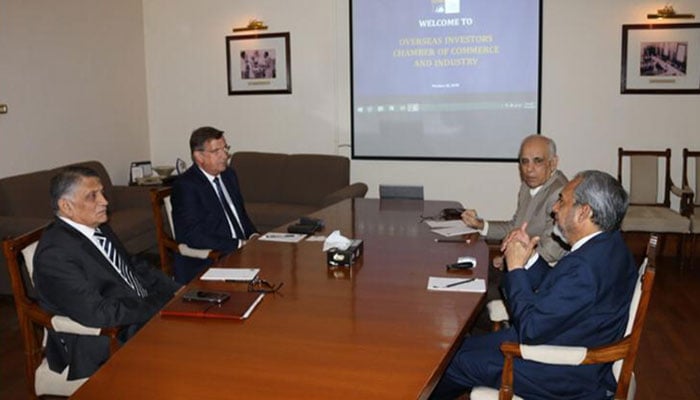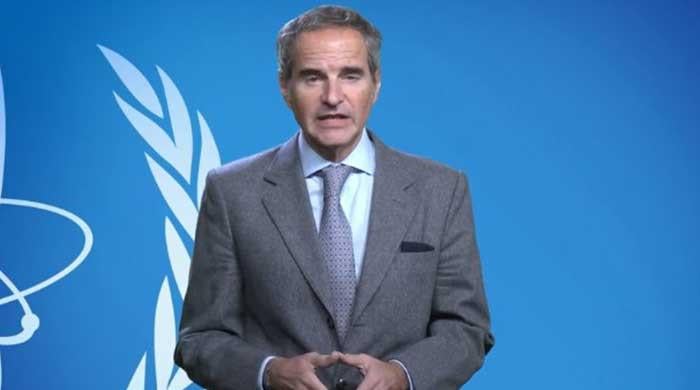Novartis looking to expand healthcare initiatives in Pakistan: chairman
Government has keen desire to address issues involved in imparting healthcare to a greater proportion of the population, says Novartis chairman
January 07, 2019

KARACHI: Asia is a fast-emerging market for pharma manufacturers, and multinational companies (MNCs) should embrace the challenges and demands of the region to meet its medical needs, Christopher Snook, the chairman of Novartis Pakistan, told Geo News.
Snook, who is also board member and legal representative for a number of Novartis Group Companies in China, India, Pakistan and Bangladesh and has more than 35 years of global experience in the industry, said that Novartis and many other pharma manufacturers have acknowledged the rapidly evolving landscape of healthcare.
“The dynamics of the region are rapidly expanding while the rising middle class here means that we have to respond very quickly to the changes in healthcare sector. We continue to [scan] the global healthcare landscape to determine therapeutic areas to make the biggest impact to society,” he said.
The chairman noted that access to new technologies allows Novartis to explore new ways of fighting diseases be it malaria, Ebola, HIV, diabetes or cancer. He said the company recently decided to increase its focus on oncology, hypertension, diabetes, autoimmune disorders, psoriasis, heart failure and migraine.
Highlighting the importance of the research and development department, Snook termed it the DNA of Novartis’ success. Last year, Novartis spent US$9 billion on R&D whereas its global turnover was US$49 billion.
“We not only manufacture innovative medicines through our Research and Development commitment but we are the world’s second largest generic manufacturer under Sandoz banner so, we are well placed to address the region in R&D and generic division”.
Asked about Pakistan’s pharma industry where 95 percent of the business is being done by generic pharma manufacturers and what role big pharma could play in emerging markets, Snook replied:
“We do not consider this as a threat to our business interest; on the contrary we believe this will help extend the drug net in large emerging markets. However, we do feel that in some of these emerging markets, MNCs are unnecessarily put at a disadvantage due to the nature of the prevailing regulatory regimes. Global pharma companies have played a constructive role in promoting the local industry by providing trained resources, transfer of best practices in manufacturing, quality controls as well as marketing. In some cases, we have even collaborated with the local industry by way of contract manufacturing agreements and even joint ventures.
“I have met both stakeholders from the government, Ministry of Health, regulators and pharma industry,” he added.
The new government is committed to resolving some issues in Pakistan’s pharma landscape, the chairman said, adding that Novartis is looking to expand its business here.
Asked about partnership challenges Novartis faces in US/EU and elsewhere, Snook said that challenges in Asia are of a completely different nature compared to other regions. “Asia is a fast emerging market and we have a good understanding of what those challenges and constraints are. We gear up our organisational capabilities according to the market’s needs in order to achieve conversations with key stakeholders in each country.”
Discussing the relationship between the pharmaceutical industry and healthcare professionals, Snook emphasised that the two are dependent on each other. “Overall healthcare dispensation cannot be expanded and improved with new therapeutic solutions [unless] we work closely with medical experts to develop and commercialise new and more efficient drugs.”
“We have three main research centres in US, China and Switzerland which cover different areas and overall clinical trial programmes which give us comprehensive data and understanding. Currently we are working on more than 200 compounds which are in various stages of clinical development and some of them are on regulatory requirements for approvals.”
He shared that the Pakistani government has a keen desire to address the issues involved in providing healthcare to a greater proportion of the population.
Novartis is the only company that executes US$140 million on novel patient-access programmes in Pakistan, the chairman noted. These programmes are aimed at improving access to relatively more expensive drugs for oncology, and other non-communicable diseases such as breast cancer, hypertension, diabetes and respiratory ailments.
“We aim to continue to build on such successful partnerships and assist in improving healthcare delivery, wherever we feel we can make an impact. We will also facilitate the availability of the medicines depending on the disease area,” Snook said.
Backed by solid fundamentals, the healthcare initiatives will give rise to a variety of business and employment opportunities, and we feel confident that strong player intent, investments and actions will underpin future growth and enable the healthcare industry to play its due role in the overall dispensation of healthcare in Pakistan, he added.









